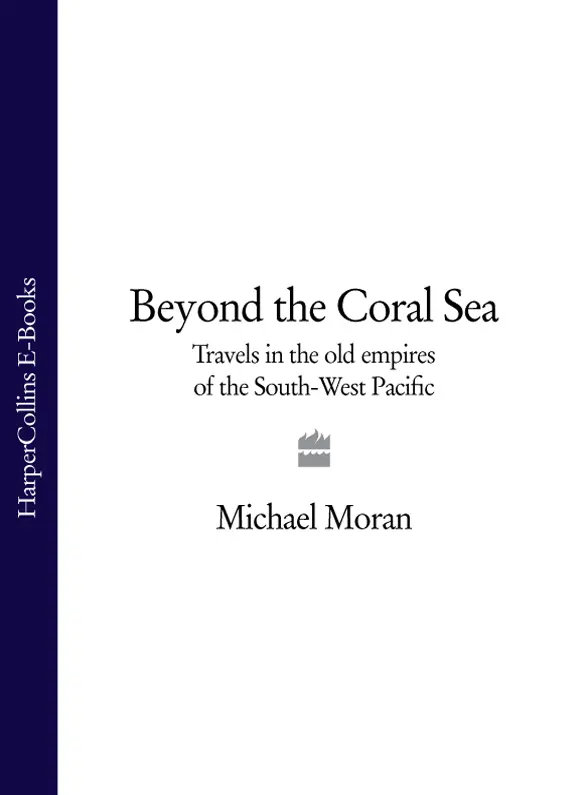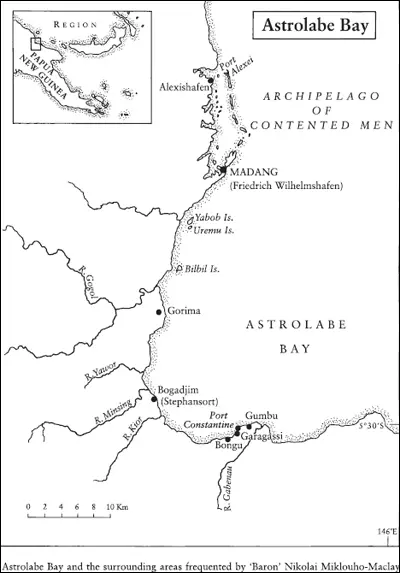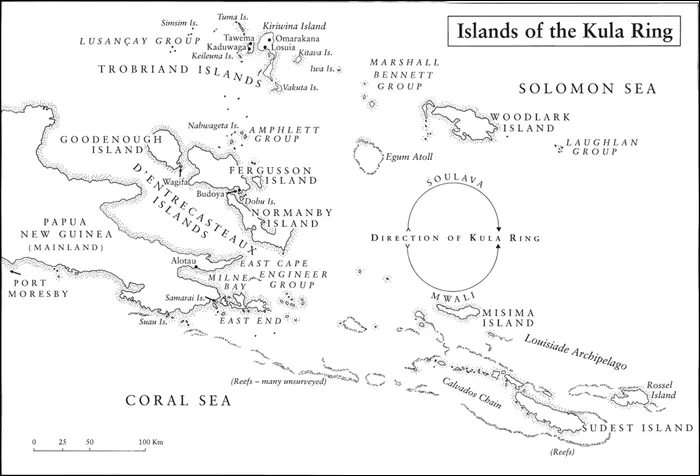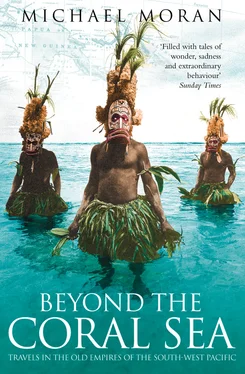
Travels in the old Empires of the South-West Pacific
MICHAEL MORAN
For my mother who saw this voyage begin but not end and the children of Papua New Guinea so full of energy and eternal delight
I have always thought the situation of a Traveller singularly hard. If he tells nothing that is uncommon he must be a stupid fellow to have gone so far, and brought home so little; and if he does, why – it is hum – aya – a tap of the Chin; – and – ‘He’s a Traveller.’
WILLIAM WALES
Astronomer and Meteorologist
Captain Cook’s Second Voyage in the Resolution
Journal 13 May, 1774
Cover
Title Page
Dedication
Epigraph
Maps
Prologue
1 Forsaking Pudding Island
2 The Eye of the Eagle
3 ‘No More ’Um Kaiser, God Save ’Um King’
4 Death is Lighter than a Feather
5 Too Hard a Country for Soft Drinks
6 ‘Mr Hallows Plays No Cricket. He’s Leaving on the Next Boat.’
7 Constitutional Crisis in Makamaka
8 ‘O Maklai, O Maklai!’ or The Archipelago of Contented People
9 Kolonialpolitik Defeats the Man from the Moon
10 Minotaurs on Gilded Couches
11 Feverish Nightmares
12 Grand Opening – Tsoi Island General Store
13 An Account of the Criminal Excesses of Charles Bonaventure du Breil
14 ‘In Loveing Memory’
15 ‘The Sick Man Goes Down with the Plane’
16 ‘Rabaul i blow up!’
17 Queen Emma
18 A Moveable Feast
19 ‘No Trespassing Except By Request’
20 Auf Wiedersehn, Kannibalen
21 Under the Mosquito Net in Malinowski’s Tent
22 Farewell to That Strange and Fatal Glamour
Epilogue
Afterword
Brief Chronology of Significant Historical Events in Papua New Guinea
Bibliography of Principal Sources
Index
Acknowledgements
Author’s Note
About the Author
Copyright
About the Publisher


‘If you dress well, they won’t eat you!’ Wallace said.
He shuffled the cards with the stump of his right arm, beginning another interminable game of patience. The light was failing, the atmosphere oppressively hot and humid as the cards flapped on the bare table. Local boys glanced in darkly as they passed the flyblown screens covering the louvred windows. They were interested in the visitor and craned for a better view. A wretched poster of Bill Clinton greeting King Harald V of Norway hung at a crazy angle from the flaking wall.
‘We thought you were Gods.’
His rippling, grey hair caught the sun and he smiled, teeth showing the past ravages of chewing betel nut. Wallace Andrew was a distinguished personage with a heart of gold. This virtue had brought him many misfortunes in life. He began to hum the hymn ‘All Things Bright and Beautiful’.
‘Such a lovely tune, don’t you think? Young people today have abandoned proper hymns.’
The ceiling fan was motionless, the air thick and still. A pretty village woman with an ancient profile began to hurriedly set the table for dinner, laying out cutlery, bananas, pineapple and some lurid green cordial in a glass jug. She covered it with mesh. Malarial mosquitoes had already begun to ride the last shafts of sunlight in the dusk. ‘Napoleon will be here at seven. They will come directly from the chamber and then go out again,’ she said in excellent English, clearly for my benefit. They generally spoke the Suau language in the islands around Milne Bay in Eastern Papua New Guinea.
‘Fine men. Like my grandfather, a fine man,’ Wallace noted sadly, another fast game of patience in progress in the gloom. He adopted a consistently high moral tone in all his conversations and talked often of selfless Christians.
‘Charles Abel, one of the first English missionaries, always wore a bow tie, white shoes, starched shirt and trousers. He was never kai kai ’d 1 because they respected him. His wife came from England too. She delivered a village baby after they landed and her white dress was soon covered in blood. They didn’t eat her. She helped them.’
Wallace was, after all, the grandson of a cannibal and an expert on matters of cannibal etiquette.
Two men carrying folders dragged open the grill on the front door and entered the main room. They glanced quickly and expectantly at the deserted bar but it had been some time since any festivities of an alcoholic or social kind had taken place there. They greeted Wallace. He stood up full of respect and pleasure that government ministers had chosen to be guests at his establishment.
‘We go up, then come down to eat, then go out.’
The brevity of their speech was almost aggressive as they noticed the white stranger in their midst. The assertive masculinity of Melanesian culture. Their dark features could scarcely be seen as they climbed the central flight of a once-grand staircase that branched into two wings of remarkable austerity and dilapidation. Their bare feet made only the slightest sound like large cats padding about. Floorboards creaked overhead and doors slammed. Silence apart from the worn cards softly slapping one over the other. Wallace scarcely glanced at the deck as he deftly adjusted his amputated arm, leaning slightly to one side, gathering them in.
‘You can walk around the whole island in the moonlight. It’s beautiful. Even if you are drunk nothing will happen to you here – not like the hell of Alotau!’
Wallace was full of trust in his fellow man yet he had suffered many betrayals. Tropical foliage spun by the moon appealed to my sense of romance, but this particular night was pitch black.
Fluorescent lights cruelly illuminated the dining room. The Kinanale Guesthouse was in desperate need of refurbishment. During colonial days it had been the single accommodation for white employees of the Steamships Trading Company. 1 Paintings of sailing ships and bush huts with strange watchtowers covered the larger cracks. A small lounge opened off the main room like a builder’s afterthought. Geckos darted in erratic motion across the stained walls. Dinah removed the mesh from the table. She laid out fish and taro on platters together with a jug of crystalclear iced water. A solitary bell sounded the hour over the football pitch, former cricket ground, former malarial swamp that lay before this once select building in the centre of the island. An air of abandonment and futility gave rise to a curious sense of threat and lethargy.
The government officials had changed into crisp shirts for the evening session and padded over to the table. Wallace, perhaps sensing their shyness, decided to introduce me.
‘This is Mr Michael from England. He is a famous man and wrote me a letter,’ searching the while in a battered briefcase. He produced the creased relic and began to read out loud, to my acute embarrassment. ‘Dear Mr Andrew, your name was given to me by Sir Kina Bona, the High Commissioner in London and I …’
Читать дальше















